
Sergei Sergeyevich Prokofiev was a Russian composer, pianist, and conductor who later worked in the Soviet Union. As the creator of acknowledged masterpieces across numerous music genres, he is regarded as one of the major composers of the 20th century. His works include such widely heard pieces as the March from The Love for Three Oranges, the suite Lieutenant Kijé, the ballet Romeo and Juliet—from which "Dance of the Knights" is taken—and Peter and the Wolf. Of the established forms and genres in which he worked, he created—excluding juvenilia—seven completed operas, seven symphonies, eight ballets, five piano concertos, two violin concertos, a cello concerto, a symphony-concerto for cello and orchestra, and nine completed piano sonatas.

Sergei Mikhailovich Eisenstein was a Soviet film director, screenwriter, film editor and film theorist. Considered one of the greatest filmmakers of all time, he was a pioneer in the theory and practice of montage. He is noted in particular for his silent films Strike (1925), Battleship Potemkin (1925) and October (1928), as well as the historical epics Alexander Nevsky (1938) and Ivan the Terrible (1945/1958). In its 2012 decennial poll, the magazine Sight & Sound named his Battleship Potemkin the 11th-greatest film of all time.
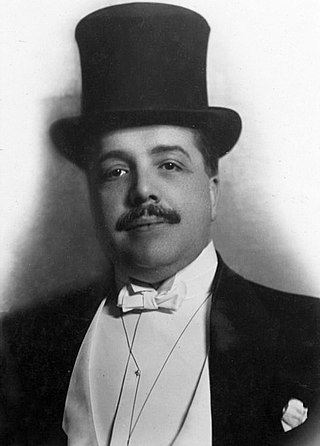
Sergei Pavlovich Diaghilev, also known as Serge Diaghilev, was a Russian art critic, patron, ballet impresario and founder of the Ballets Russes, from which many famous dancers and choreographers would arise.
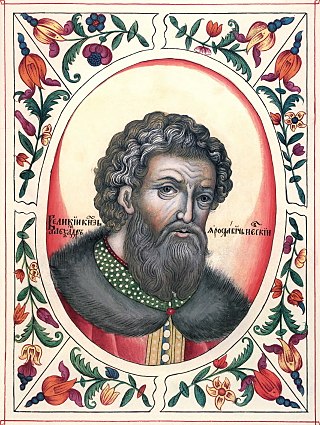
Alexander Yaroslavich Nevsky was Prince of Novgorod, Grand Prince of Kiev (1249–1263), and Grand Prince of Vladimir (1252–1263).

Pskov is a city in northwestern Russia and the administrative center of Pskov Oblast, located about 20 kilometers (12 mi) east of the Estonian border, on the Velikaya River. Population: 193,082 (2021 Census); 203,279 (2010 Census); 202,780 (2002 Census); 203,789 (1989 Soviet census).
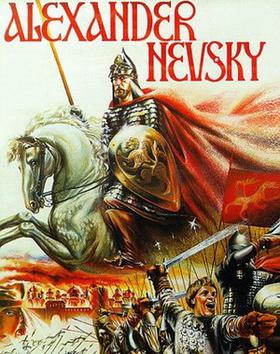
Alexander Nevsky is a 1938 Soviet historical drama film directed by Sergei Eisenstein. It depicts the attempted invasion of Novgorod in the 13th century by the Teutonic Knights of the Holy Roman Empire and their defeat by Prince Alexander, known popularly as Alexander Nevsky (1220–1263).
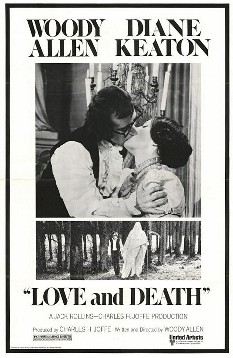
Love and Death is a 1975 American comedy film written and directed by Woody Allen. It is a satire on Russian literature starring Allen and Diane Keaton as Boris and Sonja, Russians living during the Napoleonic Era who engage in mock-serious philosophical debates. Allen considered it the funniest film he had made up until that point.
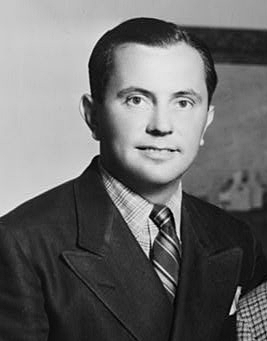
Vernon Duke was a Russian-born American composer and songwriter who also wrote under his birth name, Vladimir Dukelsky. He is best known for "Taking a Chance on Love," with lyrics by Ted Fetter and John Latouche (1940), "I Can't Get Started," with lyrics by Ira Gershwin (1936), "April in Paris," with lyrics by E. Y. ("Yip") Harburg (1932), and "What Is There To Say," for the Ziegfeld Follies of 1934, also with Harburg. He wrote the words and music for "Autumn in New York" (1934) for the revue Thumbs Up! In his book, American Popular Song, The Great Innovators 1900-1950, composer Alec Wilder praises this song, writing, “The verse may be the most ambitious I’ve ever seen." Duke also collaborated with lyricists Johnny Mercer, Ogden Nash, and Sammy Cahn.
Alexander Nevsky (1221–1263) was a Russian statesman and military hero, serving as Prince of Novgorod, Grand Prince of Kiev and Grand Prince of Vladimir

The Battle on the Ice, also known as the Battle of Lake Peipus or Battle of Lake Chud, took place on 5 April 1242. It was fought on the frozen Lake Peipus when the united forces of the Republic of Novgorod and Vladimir-Suzdal, led by Prince Alexander Nevsky, emerged victorious against the forces of the Livonian Order and Bishopric of Dorpat, led by Bishop Hermann of Dorpat.

Saint Alexander Nevsky Lavra or Saint Alexander Nevsky Monastery was founded by Peter I of Russia in 1710 at the eastern end of the Nevsky Prospekt in Saint Petersburg, in the belief that this was the site of the Neva Battle in 1240 when Alexander Nevsky, a prince, defeated the Swedes. But the battle took place about 19 kilometres (12 mi) away from that site. "On April 5, 1713, in St. Petersburg, in the presence of Peter I, the wooden Church of the Annunciation was consecrated. This day is considered the official founding date of the Alexander Nevsky Lavra."

Nikolay Konstantinovich Cherkasov was a Soviet and Russian actor. He was named People's Artist of the USSR in 1947.
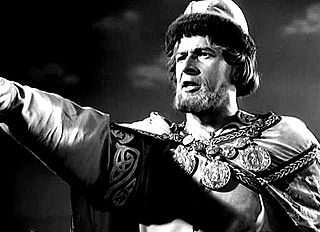
Alexander Nevsky is the score composed by Sergei Prokofiev for Sergei Eisenstein's 1938 film Alexander Nevsky. The subject of the film is the 13th century incursion of the knights of the Livonian Order into the territory of the Novgorod Republic, their capture of the city of Pskov, the summoning of Prince Alexander Nevsky to the defense of Rus', and his subsequent victory over the crusaders in 1242. The majority of the score's song texts were written by the poet Vladimir Lugovskoy.
Ivan the Terrible, Op. 116, is the score composed by Sergei Prokofiev for Sergei Eisenstein's film Ivan the Terrible (1945) and its sequel (1958), the first two parts of an incomplete trilogy. The project was Prokofiev's second collaboration with Eisenstein, the first being the popular Alexander Nevsky (1938). The majority of the non-liturgical song texts were written by Vladimir Lugovskoy, who collaborated with Prokofiev on the texts for Alexander Nevsky.

Georgy Vasilyevich Sviridov was a Soviet and Russian composer. He is most widely known for his choral music, strongly influenced by the traditional chant of the Russian Orthodox Church, as well as his orchestral works which often celebrate elements of Russian culture.
Nevsky String Quartet is a string quartet based in St. Petersburg, Russia. They are noted for their award-winning performances of Russian music and their performances of contemporary music.

Sergei Prokofiev's Lieutenant Kijé music was originally written to accompany the film of the same name, produced by the Belgoskino film studios in Leningrad in 1933–34 and released in March 1934. It was Prokofiev's first attempt at film music, and his first commission.
Nevsky (masculine), Nevskaya (feminine), or Nevskoye (neuter) may refer to:














